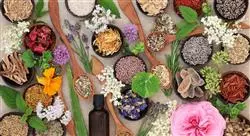University certificate
The world's largest faculty of nursing”
Introduction to the Program
You will be able to stay up to date in Applied Phytotherapy in Nursing without neglecting your work responsibilities, thanks to a 100% online university education designed for working professionals"
The numerous ongoing pieces of research into Phytotherapy have successfully focused their efforts on using new technologies to improve the precession of the products and their efficacy, especially in the approach to patients with pathologies of the respiratory system or with cardiovascular problems.
In this panorama of scientific progress, information on the benefits of Phytotherapy has generated greater acceptance by the general population, who find it a less aggressive therapy than traditional drugs. A scenario where the up-to-date nursing professional cannot remain on the sidelines, due to the increased use of Phytotherapy as a treatment for pathologies such as asthma, anxiety or even lung cancer. That is why TECH has created this university program, whose main objective is to offer the scientific evidence in this field through an innovative teaching methodology and a specialized teaching team.
Thus, through multimedia resources such as explanatory videos, diagrams or specialized readings, the nurse will be able to learn more about the application of phytotherapy in conditions affecting the digestive system, the urinary system, dermatological phytotherapy or the most current studies on the active principles of plants, pharmaceutical forms and galenic preparations. Likewise, the case studies presented by the specialized professionals that make up this program will be of great help to you, thanks to their direct application to your usual clinical practice.
TECH thus provides an excellent opportunity for the nursing professional who wishes to keep up to date with progress in Applied Phytotherapy, through a university education that can be accessed wherever and whenever they wish. In this way, through an electronic device with internet connection, students can access the syllabus hosted on the virtual campus. Moreover, students can distribute the course load according to their needs.
The effectiveness of Phytotherapy has increased thanks to new technologies. This Masters Degree shows you the most recent advances in its application in dermatological or cardiovascular conditions"
This Masters Degree in Advances in Applied Phytotherapy in Nursing contains the most complete and up-to-date scientific program on the market. Its most notable features are:
- Practical case studies are presented by experts in Phytotherapy
- The graphic, schematic, and practical contents with which they are created, provide scientific and practical information on the disciplines that are essentialfor professional practice
- Practical exercises where self-assessment can be used to improve learning
- Its special emphasis on innovative methodologies
- Theoretical lessons, questions to the expert, debate forums on controversial topics, and individual reflection assignments
- Content that is accessible from any fixed or portable device with an Internet connection
TECH has assembled a relevant teaching team that will bring you the latest knowledge on the use of plant-based drugs in respiratory system conditions"
The program’s teaching staff includes professionals from the sector who contribute their work experience to this program, as well as renowned specialists from leading societies and prestigious universities.
The multimedia content, developed with the latest educational technology, will provide the professional with situated and contextual learning, i.e., a simulated environment that will provide immersive knowledge programmed to learn in real situations.
This program is designed around Problem-Based Learning, whereby the professional must try to solve the different professional practice situations that arise throughout the program. For this purpose, the student will be assisted by an innovative interactive video system created by renowned and experienced experts.
From your computer or tablet, you can access, 24 hours a day, the most comprehensive content on phytotherapy in pediatrics, pregnancy and lactation"

Over just 12 months, you will get to know the latest studies focused on the use of phytotherapy in patients with diseases such as lung cancer"
Why study at TECH?
TECH is the world’s largest online university. With an impressive catalog of more than 14,000 university programs available in 11 languages, it is positioned as a leader in employability, with a 99% job placement rate. In addition, it relies on an enormous faculty of more than 6,000 professors of the highest international renown.

Study at the world's largest online university and guarantee your professional success. The future starts at TECH”
The world’s best online university according to FORBES
The prestigious Forbes magazine, specialized in business and finance, has highlighted TECH as “the world's best online university” This is what they have recently stated in an article in their digital edition in which they echo the success story of this institution, “thanks to the academic offer it provides, the selection of its teaching staff, and an innovative learning method aimed at educating the professionals of the future”
A revolutionary study method, a cutting-edge faculty and a practical focus: the key to TECH's success.
The most complete study plans on the university scene
TECH offers the most complete study plans on the university scene, with syllabuses that cover fundamental concepts and, at the same time, the main scientific advances in their specific scientific areas. In addition, these programs are continuously being updated to guarantee students the academic vanguard and the most in-demand professional skills. In this way, the university's qualifications provide its graduates with a significant advantage to propel their careers to success.
TECH offers the most comprehensive and intensive study plans on the current university scene.
A world-class teaching staff
TECH's teaching staff is made up of more than 6,000 professors with the highest international recognition. Professors, researchers and top executives of multinational companies, including Isaiah Covington, performance coach of the Boston Celtics; Magda Romanska, principal investigator at Harvard MetaLAB; Ignacio Wistumba, chairman of the department of translational molecular pathology at MD Anderson Cancer Center; and D.W. Pine, creative director of TIME magazine, among others.
Internationally renowned experts, specialized in different branches of Health, Technology, Communication and Business, form part of the TECH faculty.
A unique learning method
TECH is the first university to use Relearning in all its programs. It is the best online learning methodology, accredited with international teaching quality certifications, provided by prestigious educational agencies. In addition, this disruptive educational model is complemented with the “Case Method”, thereby setting up a unique online teaching strategy. Innovative teaching resources are also implemented, including detailed videos, infographics and interactive summaries.
TECH combines Relearning and the Case Method in all its university programs to guarantee excellent theoretical and practical learning, studying whenever and wherever you want.
The world's largest online university
TECH is the world’s largest online university. We are the largest educational institution, with the best and widest online educational catalog, one hundred percent online and covering the vast majority of areas of knowledge. We offer a large selection of our own degrees and accredited online undergraduate and postgraduate degrees. In total, more than 14,000 university degrees, in eleven different languages, make us the largest educational largest in the world.
TECH has the world's most extensive catalog of academic and official programs, available in more than 11 languages.
Google Premier Partner
The American technology giant has awarded TECH the Google Google Premier Partner badge. This award, which is only available to 3% of the world's companies, highlights the efficient, flexible and tailored experience that this university provides to students. The recognition as a Google Premier Partner not only accredits the maximum rigor, performance and investment in TECH's digital infrastructures, but also places this university as one of the world's leading technology companies.
Google has positioned TECH in the top 3% of the world's most important technology companies by awarding it its Google Premier Partner badge.
The official online university of the NBA
TECH is the official online university of the NBA. Thanks to our agreement with the biggest league in basketball, we offer our students exclusive university programs, as well as a wide variety of educational resources focused on the business of the league and other areas of the sports industry. Each program is made up of a uniquely designed syllabus and features exceptional guest hosts: professionals with a distinguished sports background who will offer their expertise on the most relevant topics.
TECH has been selected by the NBA, the world's top basketball league, as its official online university.
The top-rated university by its students
Students have positioned TECH as the world's top-rated university on the main review websites, with a highest rating of 4.9 out of 5, obtained from more than 1,000 reviews. These results consolidate TECH as the benchmark university institution at an international level, reflecting the excellence and positive impact of its educational model.” reflecting the excellence and positive impact of its educational model.”
TECH is the world’s top-rated university by its students.
Leaders in employability
TECH has managed to become the leading university in employability. 99% of its students obtain jobs in the academic field they have studied, within one year of completing any of the university's programs. A similar number achieve immediate career enhancement. All this thanks to a study methodology that bases its effectiveness on the acquisition of practical skills, which are absolutely necessary for professional development.
99% of TECH graduates find a job within a year of completing their studies.
Master's Degree in Advances in Applied Phytotherapy in Nursing
.
The virtues of plants have been known since the beginning of humanity itself. Clay tablets belonging to Sumer record the use of botany as a healing means. The Ebers papyri, written in Egypt in 1500 B.C., describe more than 800 forms of plant-based medicines. Why leave this millenary knowledge aside in the face of modern healthcare? The Master's Degree in Advances in Applied Phytotherapy in Nursing designed by TECH Global University is that indispensable call to the roots of medicine. A compendium of extremely useful knowledge dispensed through the innovative distance learning system Relearning, which will give you greater range of learning in record time. The content is endorsed, supervised and taught by a curricular team of the highest level, under the rigorous standards of health sciences. It is not, therefore, a superfluous course in alternative therapies of little scientific suitability, it is a complete academic program, certified and of an essential esteem to complement your studies as a professional of outstanding level.
Learn all about phytotherapy
.
Voltaire, famed philosopher and poet once wrote, The art of medicine consists in entertaining the patient while nature cures his disease."" Over the decades, the scientific pragmatism to which the health sciences have adhered has made them detach themselves from such a premise, establishing a wide gap between them and the so-called ""alternative medicine"". However, in recent years, academic circles have had to recognize the usefulness of some of these heterodox methods. For this reason, during 2013, the WHO initiated a network to encourage the use of traditional medicine under guidelines of safety and rationalism. Phytotherapy, whose advances have helped the field of health, enters this field. Aspirin, for example, was manufactured from willow bark. These facts suggest how fascinating and fundamental a postgraduate course like the one we offer you is. Do you want to become versed in the pharmaceutical knowledge of the botanical world? At TECH we will turn you into an advanced professional.








